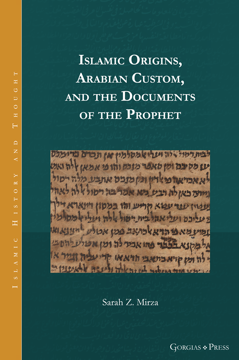Mirza (Sarah Z.), Islamic Origins, Arabian Custom, and the Documents of the Prophet, Piscataway, NJ, Gorgias Press, ("Islamic History and Thought; 17"), 2022, 335 p. 2022. ISBN 978-1463206444
Author
Sarah Z. Mirza is Associate Professor of Religious Studies at the College of Wooster.
Presentation

with the Qurʾān and ḥadīth, pragmatic documents negotiating land, taxes, and tribal relations are attributed to the Prophet Muḥammad ( 570-632 CE) in early Islamic historiography. These are often viewed as relics reflecting the Prophet’s religio-political mission, or as anachronistic texts spuriously ascribed to him. Challenging both conclusions, this book argues that an indigenous Arabian legal and documentary tradition, distinct from classical Islamic law, can be traced in these documents. Laying out the formularies and formulae of around 200 such documents, these are compared to early Arabic papyri as well as older corpora including Aramaic conveyance documents, Sabaic letters, and Nabataean tomb inscriptions. The book also maps the variation found across medieval redactions of some of the documents; the case of one distinctive legal clause; and the tribal traditions of those who received the documents. The documents of the Prophet maintain a register of everyday transactions and customary law which survives compilation and redaction and is embedded in older local and transregional infrastructures which circulate the language, media, and forms for documents. These documents encourage a reconsideration of the concepts of authorship, literacy, and authenticity applied to medieval texts, as well as the presumed centrality of confessional identity in the legal infrastructures described by medieval Islamic genres such as sīra (biography), ḥadīth (traditions), and taʾrīkh (history). Rather than reflecting authorship as the creative acts of individuals, literacy as the decoding of written text, and authenticity as the faithful transmission of original texts over time, the documents of the Prophet are reflective of transregional communication technologies, customs that trace long-lived, geographically diffuse infrastructures of which formulae are the remnants.
(Credit Photo : https://www.historytoday.com/archive/origins-islam)
